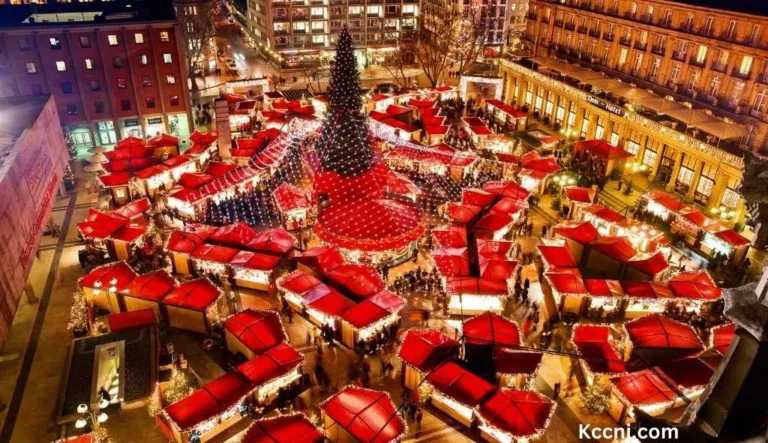Why Do We Celebrate Christmas? 10 Reasons
Christmas is celebrated to commemorate the birth of Jesus Christ, spread love and compassion, honor cultural traditions, and bring people together. It’s a time for family, generosity, and reflection, marked by festive customs and religious observances worldwide.
The Origins of Christmas
Christmas, derived from the Old English term “Cristes Maesse” (Mass of Christ), is a Christian holiday that has evolved into a global celebration. While the exact date of Jesus Christ’s birth is unknown, December 25 was established as the official date in the 4th century.
Historical Context
The choice of December 25 as Christmas Day has several possible origins:
- Roman Christian historian Sextus Julius Africanus dated Jesus’ conception to March 25, which would result in a December 25 birth after nine months.
- December 25 was the traditional date of the winter solstice in the Roman Empire, coinciding with the Roman festival Dies Natalis Solis Invicti (birthday of Sol Invictus, the ‘Invincible Sun’).
- Early Christians may have chosen this date to align with existing pagan winter festivals, making it easier for new converts to accept the holiday.
Early Christian Observances
Initially, early Christians did not celebrate Christ’s birth. The first recorded Christmas celebration occurred in Rome in 336 AD. As Christianity spread, so did the observance of Christmas:
- In the East, Jesus’ birth was initially celebrated with Epiphany on January 6, focusing more on his baptism.
- Christmas was introduced in Constantinople in 379 and in Antioch around 388.
- By the 6th century, Christmas was celebrated in Jerusalem, as evidenced by the Georgian Iadgari.
Medieval Development
During the Early Middle Ages, Epiphany overshadowed Christmas Day in western Christianity. However, the medieval calendar soon became dominated by Christmas-related holidays:
- The 40 days before Christmas became “the forty days of St. Martin,” now known as Advent.
- The Council of Tours in 567 established the season of Christmastide, encompassing the twelve days from Christmas to Epiphany.
- Christmas gained prominence after Charlemagne was crowned Emperor on Christmas Day in 800.
Reasons for Celebrating Christmas
1. Commemorating the Birth of Jesus Christ
For Christians, Christmas is primarily a religious observance marking the birth of Jesus Christ, believed to be the Son of God. This event is central to Christian theology and represents God’s love for humanity.
2. Spreading Love and Compassion
Christmas embodies values of love, compassion, and goodwill towards all. The holiday season encourages:
- Acts of kindness and generosity
- Charitable giving and volunteering
- Reconciliation and forgiveness
3. Creating and Honoring Traditions
Christmas traditions create a sense of continuity and connect generations. These customs include:
- Decorating Christmas trees
- Hanging stockings
- Singing carols
- Exchanging gifts
- Preparing special meals
4. Fostering Family Bonding and Togetherness
The holiday provides an opportunity for families and friends to come together, strengthening bonds through:
- Family gatherings
- Shared meals
- Collaborative activities like decorating or baking
5. Bringing Light to Winter Darkness
In many cultures, Christmas serves as a beacon of hope during the darkest time of the year:
- Christmas lights symbolize the triumph of light over darkness
- Candles and decorations bring warmth and cheer to the winter season
6. Cultural Celebration
Christmas has evolved beyond its religious roots to become a cultural phenomenon celebrated by people of various faiths and backgrounds. It incorporates diverse cultural elements and local traditions worldwide.
7. Economic Significance
The Christmas season has a significant economic impact:
- Increased retail sales and consumer spending
- Job creation in various sectors
- Boost to tourism and hospitality industries
8. Time for Reflection and Gratitude
As the year comes to a close, Christmas prompts:
- Reflection on the past year’s events
- Expressions of gratitude for blessings received
- Setting intentions for the coming year
9. Promoting Peace and Goodwill
The Christmas message often emphasizes peace and goodwill among all people, encouraging:
- Conflict resolution
- International cooperation
- Community harmony
10. Artistic and Creative Expression
Christmas inspires various forms of artistic expression:
- Music and carols
- Literature and storytelling
- Visual arts and decorations
Christmas Traditions Around the World

Christmas celebrations vary widely across cultures, blending religious observances with local customs and secular practices.
Western Traditions
In many Western countries, common Christmas traditions include:
- Decorating Christmas trees
- Exchanging gifts
- Attending church services
- Enjoying festive meals with family and friends
- Santa Claus or Father Christmas bringing gifts to children
Eastern Orthodox Traditions
Eastern Orthodox churches, which often follow the Julian calendar, celebrate Christmas on January 7 (Gregorian calendar). Traditions include:
- Fasting before Christmas
- Special church services
- Traditional foods like kutia (a wheat pudding)
Latin American Traditions
In Latin America, Christmas celebrations often feature:
- Nativity scenes (nacimientos)
- Posadas (reenactments of Mary and Joseph’s search for lodging)
- Midnight Mass (Misa de Gallo)
- Special foods like tamales or pan de pascua
Asian Traditions
In countries where Christianity is not the majority religion, Christmas is often celebrated as a secular holiday:
- In Japan, Christmas is a time for romantic dates and eating Kentucky Fried Chicken
- In India, mango or bamboo trees may be decorated instead of evergreens
- In the Philippines, the celebration includes a long holiday season and elaborate parols (star-shaped lanterns)
African Traditions
African Christmas celebrations often blend Christian practices with local customs:
- In Ethiopia, Christmas (called Ganna) is celebrated on January 7 with special church services and traditional games
- In South Africa, Christmas often involves outdoor activities and barbecues due to the summer weather
The Evolution of Christmas Celebrations
Christmas celebrations have changed significantly over time, influenced by cultural, religious, and societal factors.
Ancient Roots
- Pre-Christian winter solstice celebrations influenced early Christmas customs
- Roman Saturnalia and Germanic Yule traditions contributed to modern Christmas practices
Medieval Period
- Christmas became a public festival incorporating evergreen decorations
- Special foods and drinks, such as Christmas ale, were developed
- Elaborate masques and pageants were popular in some regions
Reformation and Controversy
- Some Protestant groups, like the Puritans, condemned Christmas celebrations as Catholic inventions
- Christmas was banned in England from 1647 to 1660 under Puritan rule
- The holiday fell out of favor in post-Revolution America due to its association with England
Victorian Revival
- Queen Victoria and Prince Albert popularized Christmas trees and family-centered celebrations
- Charles Dickens’ “A Christmas Carol” influenced modern Christmas ideals of charity and family
20th Century Commercialization
- The image of Santa Claus was standardized and popularized by advertising
- Gift-giving became increasingly commercialized
- Christmas music and movies became an integral part of popular culture
21st Century Trends
- Increased recognition of diverse holiday traditions
- Growing emphasis on sustainability and eco-friendly celebrations
- Digital technology influencing how people shop, communicate, and celebrate during the holiday season
The Religious Significance of Christmas
For Christians, Christmas holds deep religious meaning beyond its cultural celebrations.
Theological Importance
- Incarnation: The belief that God became human in the person of Jesus Christ
- Fulfillment of prophecy: Many Christians see Jesus’ birth as the fulfillment of Old Testament prophecies
- Beginning of salvation history: Christmas marks the start of God’s plan for human redemption
Liturgical Observances
- Advent: The four-week period of preparation before Christmas
- Christmas Eve services: Often including candlelight vigils or midnight masses
- Christmas Day services: Celebrating the birth of Christ
Religious Symbols and Their Meanings
- Nativity scenes: Representing the birth of Jesus in a manger
- Star of Bethlehem: Symbolizing the star that guided the Wise Men
- Angels: Representing the heavenly hosts that announced Christ’s birth
Secular Aspects of Christmas
While rooted in Christian tradition, Christmas has developed many secular aspects that are widely celebrated.
Santa Claus and Gift-Giving
- The modern image of Santa Claus evolved from St. Nicholas and other gift-giving figures
- The tradition of leaving milk and cookies for Santa
- The concept of Santa’s workshop at the North Pole
Christmas in Popular Culture
- Classic Christmas movies and TV specials
- Christmas-themed literature and poetry
- Popular Christmas music and carols
Decorations and Symbols
- Christmas trees and their ornaments
- Wreaths and garlands
- Mistletoe and holly
Food and Drink Traditions
- Traditional Christmas dinners (varying by culture)
- Christmas cookies and desserts
- Festive beverages like eggnog

The Global Impact of Christmas
Christmas has a significant impact on various aspects of society worldwide.
Economic Effects
- Retail sales spike during the holiday season
- Increased travel and tourism
- Seasonal employment opportunities
Social Impact
- Family reunions and strengthening of social bonds
- Charitable giving and volunteering increase
- Potential stress and financial strain for some individuals
Environmental Considerations
- Increased waste generation from packaging and decorations
- Higher energy consumption from lighting and travel
- Growing interest in eco-friendly and sustainable Christmas practices
Cultural Exchange
- Adoption of Christmas traditions in non-Christian countries
- Fusion of local customs with global Christmas practices
- Influence on international diplomacy and goodwill
Challenges and Controversies Surrounding Christmas
Despite its popularity, Christmas faces various challenges and debates in modern society.
Commercialization Concerns
- Criticism of excessive consumerism during the holiday season
- Debate over the true meaning of Christmas being overshadowed by materialism
Religious vs. Secular Observance
- Tension between religious significance and secular celebrations
- Debates over public displays of religious Christmas symbols
Inclusivity and Diversity
- Efforts to make holiday celebrations more inclusive of diverse beliefs
- Discussions about appropriate greetings (e.g., “Merry Christmas” vs. “Happy Holidays”)
Work-Life Balance
- Challenges for those who work during the holiday season
- Stress related to meeting social and familial expectations
Health and Well-being
- Increased rates of depression and loneliness for some during the holidays
- Concerns about overindulgence in food and alcohol
Conclusion
Christmas, with its rich history and diverse traditions, continues to be a significant cultural and religious event worldwide. Whether celebrated as a deeply spiritual occasion or a secular holiday, Christmas brings people together, encourages generosity and reflection, and marks a special time of year for billions around the globe.
As society evolves, so too does the way Christmas is observed, adapting to new cultural norms while maintaining many beloved traditions. Despite challenges and debates, the core messages of love, peace, and goodwill associated with Christmas remain relevant and inspiring to many, transcending religious and cultural boundaries.







